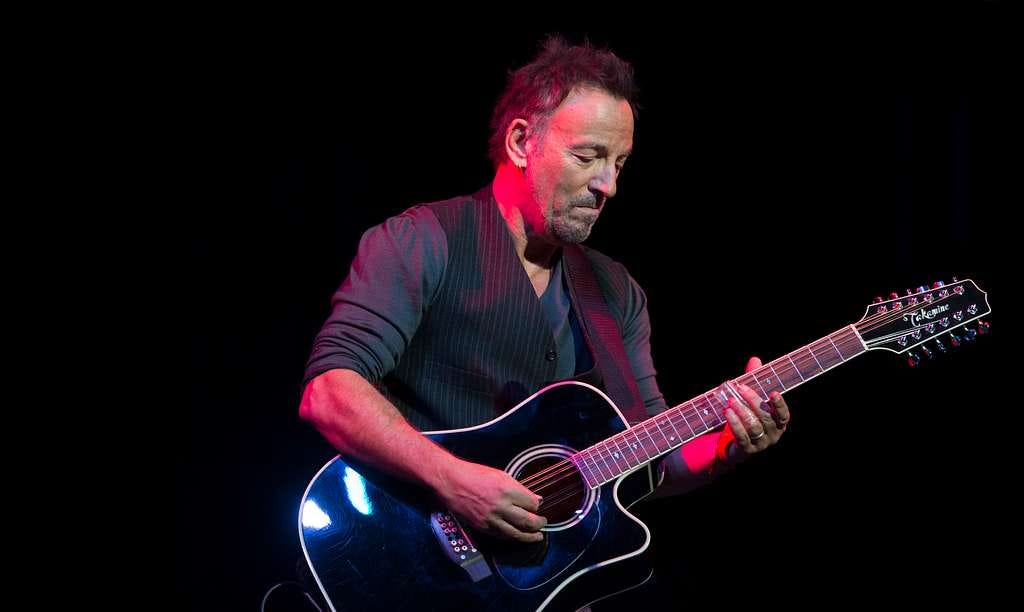Bruce Springsteen's Surprising Conservatism
Some of the Boss' greatest hits are about self-empowerment and self-reliance.

“Preferring variety over uniformity, acknowledging a moral order composed of human persons, not of mere political and economic atoms subservient to the state. We have not been appointed the correctors of mankind; but under God, we may be an example to mankind.”
Russell Kirk, A Program for Conservatives (1954).
You may have seen her. Every fan of the NFL has seen the phenomenon, with mixed reactions. Taylor Swift at a Chiefs game exuberantly cheering Travis Kelce’s touchdowns. Though her songs are not to my taste (bubble gum for the ears), I admire her longevity. Her first hit was in 2006, her last, well, right now.
When thinking about an artist who made impactful, memorable, and insightful music, Bruce Springsteen, it is interesting to note that his “hits” period was essentially 11 years from the release of the song “Rosalita” in 1973 to the album Born in the USA in 1984. There were isolated songs such as his academy-winning work for the movie Philadelphia in 1994 or “Secret Garden” the following year. 2002’s The Rising, timely after 9/11, or 2012’s Wrecking Ball were lauded by critics, for good reason. Yet even on Sirius’s gazillion channels, you might hear them only on the one dedicated to Springsteen.
I am talking of the popular songs that get his zealous fans (I am among them) onto their feet and singing along at his epic three-hour, no-break concerts. When Gurinder Chadha made 2019’s Blinded by the Light, a movie about Javed, a teenaged British Pakistani who uses Springsteen’s work to cope with economic turmoil and racism, he set the film in the 1980s intentionally closing out any of Bruce’s later work.
Bruce Springsteen, “the boss” in fan parlance, is an avowed liberal. He has always supported the Democrats. His working man ethos and anti-Vietnam songs featured in Born in the USA are catnip to the left. So Bruce would probably be appalled to learn that his best work, the songs from that 1973-84 period, are not as progressive as he imagined. One of my ironclad beliefs, along with small government, individual agency, and the primacy of the Green Bay Packers, is that art can transcend the artist. In the case of Springsteen, many of his songs contain a decidedly conservative message.
Born in the USA is arguably Bruce’s most anti-American album. The titular song was used mistakenly as an American anthem for a while, but the lyrics tell a different story. Yet consider another song from the same album, one often played at his concerts called “No Surrender,”
And hear your sister’s voice calling us home
Across the open yards
Well maybe we’ll cut someplace of our own
With these drums and these guitars
’Cause we made a promise we swore we’d always remember
No retreat, baby, no surrender
The subject of “No Surrender” builds on a recurrent theme in Springsteen’s songs—using one’s talent and merit to make a better life.
In his typically clear, incisive verbiage, Milton Friedman took on John Kennedy’s most famous quote and found it wanting.
“The paternalistic ‘what your country can do for you’ implies that government is the patron, the citizen the ward, a view that is at odds with the free man’s belief in his own responsibility for his own destiny. The organismic, ‘what you can do for your country’ implies that government is the master or the deity, the citizen, the servant or the votary. To the free man, the country is the collection of individuals who compose it, not something over and above them.”
-Milton Friedman
It is odd to link Springsteen and Friedman, but it is not just “No Surrender,” where the subject talks of agency and individual destiny. On his second album, The Wild, the Innocent & the E Street Shuffle, there is a dynamic ode to Rosalita in which he asks the titular girl’s father to just give him a break. The song seems to be simply about a budding romance, but is something more.
“Well, tell him this is his last chance to get his daughter in a fine romance.
Because a record company, Rosie, just gave me a big advance.”
This is a declarative capitalistic triumph. He will not let his impoverished circumstances stand in the way of getting the girl because he knows of his talent, and what is more, so do the suits at the record company.
In Darkness on the Edge of Town’s “Badlands,” Springsteen expresses both a clear understanding of the nature of man but also of government:
“Poor man wants to be rich, rich man wants to be king, and the king ain’t satisfied till he owns everything.”
Our nation was founded not just to overthrow the rule of a specific king (George III) but against the concept of government-imposed tyranny. Bruce is correct; kings and most political leaders are rarely satisfied, which is why a conservative would seek to limit the state’s power and those who wield it. Russell Kirk noted, “The ideologue, on the contrary, thinks of politics as a revolutionary instrument for transforming society and even transforming human nature.” In Badlands, there are no such delusions.
He concludes that song with again affirming agency:
Badlands, you gotta live it every day
Let the broken hearts stand as the price you’ve gotta pay
We’ll keep pushin’ ’til it’s understood
And these badlands start treating us good
Another Darkness song, “Promised Land,” begins in the progressive vein of powerlessness,
I’ve done my best to live the right way
I get up every morning and go to work each day
But your eyes go blind and your blood runs cold
Sometimes I feel so weak I just want to explode
Explode and tear this old town apart
Take a knife and cut this pain from my heart
Find somebody itching for something to start
But consider the remainder of the lyrics. This song was featured at the critical moment in Blinded by the Light when Javed realizes his power, and once he does so, he makes choices that lead to the improvement of his life, and so it is with the figure in “Promised Land,”
Well, there’s a dark cloud rising from the desert floor,
I packed my bags and I’m heading straight into the storm,
Gonna be a twister to blow everything down,
That ain’t got the faith to stand its ground,
Blow away the dreams that tear you apart,
Blow away the dreams that break your heart,
Blow away the lies that leave you nothing but lost and brokenhearted.
This protagonist is not waiting on the government or the likes of a doddering 80-year-old or 30-something, super social media savvy congressperson to save him. There is an inherent parent-child relationship when the government is in control. The term dependency is not just a rightist scare tactic but something seen by any sociologist engaged in finding the truth. It is why the founders demanded a government not just of and by the people but also for the people. The United States government exists to serve the people, not the other way around, or as Bruce Springsteen says, far better than I:
The dogs on main street howl. ’Cause they understand,
If I could take one moment into my hands.
Mister, I ain’t a boy, no, I’m a man
And I believe in a promised land.
During Bruce’s greatest song, “Thunder Road,” he uses a personal pronoun 23 times. The song was not about government, movements, or organizations. It was an individual deciding to better his life, to be better than fate intended. It is a conservative American anthem. The song begins with the protagonist decrying his circumstances, as many do with their belief in their inequities.
Waste your summer praying in vain
For a savior to rise from these streets
Well now I’m no hero that’s understood.
The subject understands the nature of human saviors, and this is especially interesting in an era of politics in which Obama was seen as just that hero (even by Springsteen). And the left rightly castigates Trump supporters for placing the former president in that role. Politicians can be effective and valuable, but they are rarely heroes through the exercise of the political process. Politics is often a grubby compromise. Some politicians were heroes in other circumstances, but John McCain was one because he served his country and sacrificed much for it. Not because he was a Senator from Arizona who wrongly championed governmental control over campaign finance.
If there is a hero in “Thunder Road,” it is actually the man “beneath the dirty hood.” Rarely in our times has there been more opportunity for self-improvement. Our ancestors had to worry about endless toil, famine, virulent diseases, or some noble making off with the results of their work. Knowing of the abundance of our nation, the song declares,
With a chance to make it good somehow,
Hey, what else can we do now?
Except roll down the window and let the wind blow back your hair
Well, the night’s busting open,
These two lanes will take us anywhere.
And like the figure in Rosalita, the hero has a plan, not predicated on government hand-outs, social justice warriors, or diversity training,
Well I got this guitar, and I learned how to make it talk.
And this quintessential American song ends with words that I think of to this day. Words not predicated on politicians or activists trying to instill fear, hatred, and envy into their audiences but words of singular triumph and power,
It’s a town full of losers, and I’m pulling out of here to win.
AD Tippet is the founder and Publisher of the Conservative Historian. Aves has conducted extensive research in Political, Religious, Social, and Educational history across all eras and geographies. He has been writing and podcasting for over 12 years. In 2020, he published his first book, The Conservative Historian. He has degrees in history, education, and an MBA. @BelAves
Please Donate to Our Efforts




“ Though her songs are not to my taste (bubble gum for the ears), I admire her longevity. Her first hit was in 2006, her last, well, right now. “
Ha! Yes I’m amazed that the kids these days are listening to the same musician whom my peers were listening to when I was their age.
This was awesome! I think a few of these points were a bit of a stretch and Springsteen might object, but it was fun to read. I’m guessing he would consider JFK’s line patriotic, rather than fascistic, even though I’m personally with you and Friedman.
I agree that there is a basic small-c conservatism to some of Springsteen’s work. For all the anti-war stuff, he does love his country and above all he loves Americans. All of his music is about celebrating regular Americans and their lives, work, relationships, customs, places, etc. Born in the USA may have been anti-Vietnam, but The Rising was very clearly a celebration of America (and NJ and NYC) after 9/11.